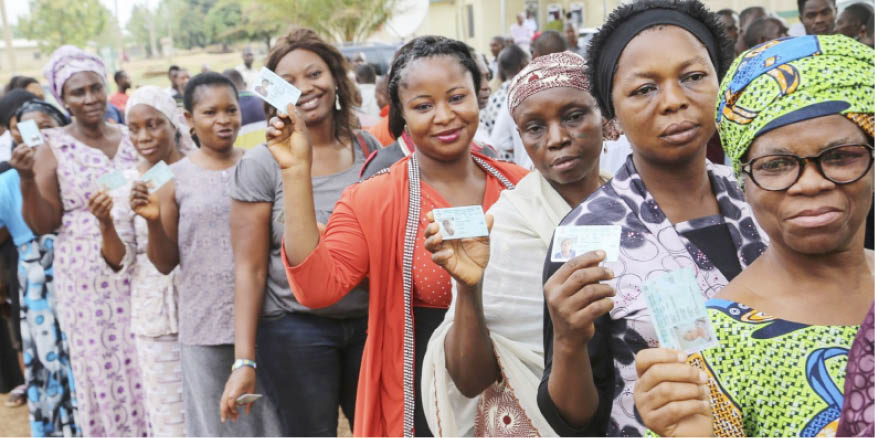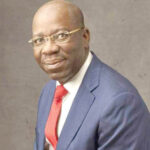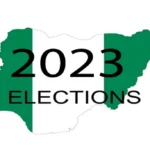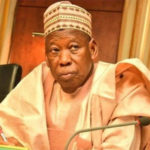This is a continuation of a chapter excerpted from a book titled Nigerian General Elections 1959 and 1979 and their aftermath written by Ahmadu Kurfi. The author who is the Maradin Katsina, is a former Executive Secretary of the Federal Electoral Commission (FEDECO).
“In traditional societies, organised on a hierarchical basis, the priests and leaders of castes and other social groups may intimidate their followers to vote in a particular way. They may use the threat of excommunication and social boycott to achieve their purpose. Every political system is influenced, to a considerable extent, by its social environment.
Government of the day may appear to use intimidation to keep themselves in power. Just as ministers utilise grants and other favours at their disposal to purchase votes, they may threaten to withhold such if voters in their constituencies do not support them. Pressure of other kinds may ·also be brought to bear upon voters through officials issuing licences and permits in a controlled economy. It is because of -devices like these that in many underdeveloped countries, the same government continues to remain in office from one election to another; such elections are all manipulated or rigged elections and not free ones. They were a feature of elections under the so-called liberalized monarchies of Europe in the nineteenth century.
There are indeed many fraudulent practices associated with elections and, in spite of legal checks, the fraudulent practices have not completely disappeared. These include duping of illiterate or blind voters by those who accompany them to the polling booth to assist them in marking their ballots; blocking of polling stations with large numbers of supporters early in the morning with a view to driving away voters, and in their absence, impersonate them later in the day; stuffing of ballot boxes or otherwise tampering with them while in transit from the polling station to the central counting place. Where bribery, intimidation and fraud are widely used, the purpose of election is defeated. Election times then cease to be occasions for the people to pass a verdict on how the power holders exercise their power and whether they deserve to be re-installed in office or be rejected to give place to another group of leaders. Power comes to be held by those who are cleverer and sharper in making use of these undesirable methods.
Free elections imply the existence of all fundamental freedoms like freedom of speech, freedom of the press and freedom of association; also, freedom of public meeting and freedom of. movement. All these are necessary if political parties are to be formed and if candidates are to stand for elections and carry on their campaigns.
Free Elections
Our examination of the opinions on the subject of free and fair election by, admittedly, few political scientists reveals that the essentials of ‘free and fair election’ boil down to the following:
(a) an independent judiciary to interpret the electoral law and adjudicate fairly on all election disputes;
(b) existence of honest and non-partisan administration or electoral body to run elections;
(c) articulated political parties able to present alternative programmes to electors, thus opportunity for these and candidates to compete with one another without let or hinderance;
(d) acceptance and tacit enforcement of the rules of the political game by all participants in the electoral processes;
(e) freedom of the voter to cast his ballot in secret without let or hinderance and to have the ballots counted and the results announced in an unbiased manner;
(f) universality of the suffrage ~and equality of the value of each vote with that of another;
(g) equality of constituencies which have been fairly demarcated without favouring any particular party or candidate, i.e., absence of gerrymandering;
(h) an electoral roll comprising names of eligible electorate who have applied to be included;
(i) absence, or minimal presence, of intimidation (social/legal), of bribery and corruption and of interferencty.in the electoral process by government or any of its agencies;
(j) other considerations not specifically mentioned in paras. (a)
– (i) above.
Obviously, there is no electoral system anywhere in ‘the world that satisfies all the criteria of free and fair elections referred to above, some of which may even conflict. The best that can be expected from any system is that it satisfies the majority of the criteria. An attempt will be made to assess the presence or absence of the criteria in the electoral system during the preparations and conduct of the 1959 and 1979 general elections. This, in fact, means a recapitulation of the submissions made in the earlier chapters about these elections. The recapitulation will be made under four broad headings, namely:
(a) the administrative, legal and judicial frameworks under which the elections were conducted;
(b) the political parties and the political culture;
(c) the voter, the suffrage and equality of the vote;
(d) factors inhibitive to free and fair election such as restriction of freedom of expression, of movement and of free assembly; intimidation, violence, bribery and corruption.
Administration and legal framework
‘Democracy’, according to Professor MacKenzie, ‘is sometimes measured by the slogans: “one man one vote”; “one vote one value”; “everyone to count for one and none for more than one”. These laudable objectives can be achieved in practice if certain conditions arc fulfilled. There must be competent administrative machinery to conduct the election. Some means to ensure that adjudication of the merits of cases arising under the electoral law is outside the government of the day, so as to avoid suspicion of interference by rulers; and lastly political mores embodied in law and practice which set bounds to the bitterness of the contest for power.
The preparations and conduct of both the 1959 and 1979 general elections were entrusted to independent electoral commissions which carried out their respective assignments with virtually no interference from anybody. The 1959 election was conducted by an electoral commission appointed by the British Colonial Government which had agree to hand over power to Nigerians after the election. The 1979 elections were organised by FEDECO which was established by the Federal Military Government which was firmly committed to relinquishing power after the conclusion of the elections. There was therefore no need or incentive for either the Colonial or the Military Government to interfere with the arrangements for the elections because there was no urge to cling to power or for the government to perpetuate itself. Nor was there any reason why the government in 1959 or 1979 would want to favour any political group to win the election, whatever the allegations to the contrary made by defeated political parties at the end of each of the elections.
The elections were conducted by civil servants under the supervision and direction of electoral commissioners, who were appointed to the post because of their integrity and neutrality of views. Not one of them was castigated because of shortcomings in his character and most, if not all, the commissioners in 1959 or 1979 were either retired public servants with distinguished and meritous service careers behind them or were serving in quasi-independent bodies such as universities or-in private business. Their bias for government was nil or, at best, tenuous. At any rate, the governments which appointed them were quitting the stage and there was no need to bow to the governments in order to get reappointed or be given any favour.
As for the civil servants, in 1959, most of the senior ones who directed and supervised election operations were expatriate British officers who were not attached to any Nigerian ethnic or other groupings and had been imbued with the tradition of a non-political civil service which could be trusted to act in the best tradition of the service. As pointed out by K.W.J. Post in his book on the 1959 elections·, though the civil servants were responsible to ministers (in the Regions), at the federal level they were responsible to the Colonial Office in London and even in the Regions most of them were expatriates. The civil servants, both the expatriates and the Nigerians, tried to act in the impartial way, in the tradition of the British civil service. The civil servants in 1979, were Nigerians but the top echelon who were the managers of the elections, had also imbibed the civil service tradition of impartiality and have passed it down to their subordinates. The Nigerian civil servants, by and large, also believed in the best tradition of the service in handling election or other public service assignments.
However, needless to say, in any group of human beings, there must be bad ones but it appeared that there were not many such bad ones among the personnel that conducted the two elections.
The Nigerian judiciary has been one of the most fiercely independent institutions in the country, very conscious of its image and independence which it cherishes and jealously guards. The judiciary in Nigeria has always been led by able, experienced and independent men, and regarded by the public to stand for the ideals of impartial judicial procedure and the rule of law. Under the Nigerian Electoral Regulations (1958) and the Electoral Decree (19 77) all matters relating to election disputes were to be referred to the ordinary courts for adjudication, the courts sitting either in their usual capacity (in 1959) or as ·Election Tribunals (in 1979) especially nominated under the electoral law. All cases of election petitions were referred to the courts which deal with them in the impartial manner expected of them. Even cases such as questions of disqualification of candidates which the Electoral Decree banned the courts from hearing, did go to the courts which ruled against FEDECO and their rulings were ·accepted and implemented all the same. There is no doubt that the Nigerian judiciary acquitted itself creditably in the dispensation of justice to candidates who felt cheated at the elections. Those who criticise the judges do so out of sheer spite, because a particular judgement went against them or against their favoured candidate.
The electoral laws for both the 1959 and 1979 elections were derived from the same source – the British election laws. The democratic ideals and traditions of the British laws were transplanted to Nigeria and hence all the niceties, the usual provisions about nomination of candidates, qualifications and disqualifications of voters and the manner and methods of conducting free and fair elections, the secrecy of the ballot, adjudication of election disputes, ·etc. were all embodied in the Nigerian electoral code. In fact, there was not much difference between the British Representation of the Peoples Act of 1918, 1948 or the Canadian equivalent of 1974, and their Nigerian counterparts: the Electoral Regulations (which were an ordinance of the British Parliament) and the Electoral Decree (which was derived from the Nigerian Electoral Act of 1962). The only major differences were in the Electoral Decree, such as prohibition of courts from hearing certain election cases, such as nomination and disqualificati9n of candidates (which nonetheless the courts heard).
However, on matters dealing with the manner and method of conduct of election and the relevant detailed arrangements, the Nigerian electoral laws bear much resemblance to their British progenitors. The laws were applied impartially to all parties and all candidates without any discrimination whatsoever.




